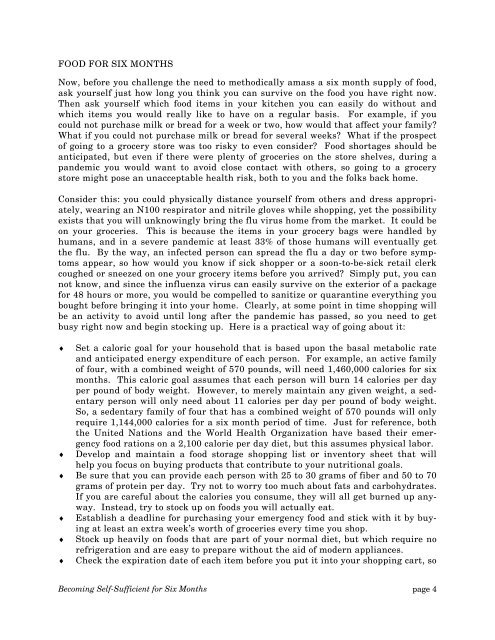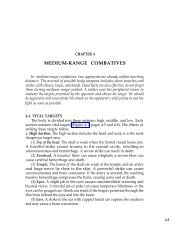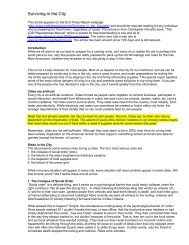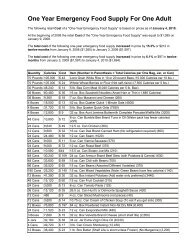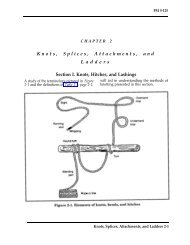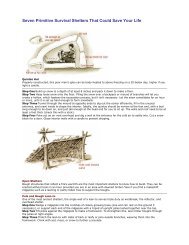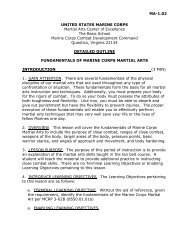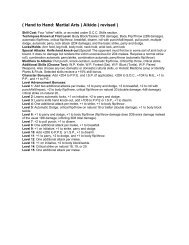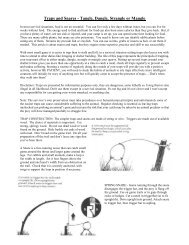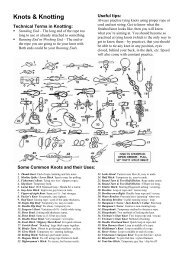Becoming Self-Sufficient for Six Months - Blog by Survival-Goods.com
Becoming Self-Sufficient for Six Months - Blog by Survival-Goods.com
Becoming Self-Sufficient for Six Months - Blog by Survival-Goods.com
Create successful ePaper yourself
Turn your PDF publications into a flip-book with our unique Google optimized e-Paper software.
FOOD FOR SIX MONTHS<br />
Now, be<strong>for</strong>e you challenge the need to methodically amass a six month supply of food,<br />
ask yourself just how long you think you can survive on the food you have right now.<br />
Then ask yourself which food items in your kitchen you can easily do without and<br />
which items you would really like to have on a regular basis. For example, if you<br />
could not purchase milk or bread <strong>for</strong> a week or two, how would that affect your family?<br />
What if you could not purchase milk or bread <strong>for</strong> several weeks? What if the prospect<br />
of going to a grocery store was too risky to even consider? Food shortages should be<br />
anticipated, but even if there were plenty of groceries on the store shelves, during a<br />
pandemic you would want to avoid close contact with others, so going to a grocery<br />
store might pose an unacceptable health risk, both to you and the folks back home.<br />
Consider this: you could physically distance yourself from others and dress appropriately,<br />
wearing an N100 respirator and nitrile gloves while shopping, yet the possibility<br />
exists that you will unknowingly bring the flu virus home from the market. It could be<br />
on your groceries. This is because the items in your grocery bags were handled <strong>by</strong><br />
humans, and in a severe pandemic at least 33% of those humans will eventually get<br />
the flu. By the way, an infected person can spread the flu a day or two be<strong>for</strong>e symptoms<br />
appear, so how would you know if sick shopper or a soon-to-be-sick retail clerk<br />
coughed or sneezed on one your grocery items be<strong>for</strong>e you arrived? Simply put, you can<br />
not know, and since the influenza virus can easily survive on the exterior of a package<br />
<strong>for</strong> 48 hours or more, you would be <strong>com</strong>pelled to sanitize or quarantine everything you<br />
bought be<strong>for</strong>e bringing it into your home. Clearly, at some point in time shopping will<br />
be an activity to avoid until long after the pandemic has passed, so you need to get<br />
busy right now and begin stocking up. Here is a practical way of going about it:<br />
♦ Set a caloric goal <strong>for</strong> your household that is based upon the basal metabolic rate<br />
and anticipated energy expenditure of each person. For example, an active family<br />
of four, with a <strong>com</strong>bined weight of 570 pounds, will need 1,460,000 calories <strong>for</strong> six<br />
months. This caloric goal assumes that each person will burn 14 calories per day<br />
per pound of body weight. However, to merely maintain any given weight, a sedentary<br />
person will only need about 11 calories per day per pound of body weight.<br />
So, a sedentary family of four that has a <strong>com</strong>bined weight of 570 pounds will only<br />
require 1,144,000 calories <strong>for</strong> a six month period of time. Just <strong>for</strong> reference, both<br />
the United Nations and the World Health Organization have based their emergency<br />
food rations on a 2,100 calorie per day diet, but this assumes physical labor.<br />
♦ Develop and maintain a food storage shopping list or inventory sheet that will<br />
help you focus on buying products that contribute to your nutritional goals.<br />
♦ Be sure that you can provide each person with 25 to 30 grams of fiber and 50 to 70<br />
grams of protein per day. Try not to worry too much about fats and carbohydrates.<br />
If you are careful about the calories you consume, they will all get burned up anyway.<br />
Instead, try to stock up on foods you will actually eat.<br />
♦ Establish a deadline <strong>for</strong> purchasing your emergency food and stick with it <strong>by</strong> buying<br />
at least an extra week’s worth of groceries every time you shop.<br />
♦ Stock up heavily on foods that are part of your normal diet, but which require no<br />
refrigeration and are easy to prepare without the aid of modern appliances.<br />
♦ Check the expiration date of each item be<strong>for</strong>e you put it into your shopping cart, so<br />
<strong>Be<strong>com</strong>ing</strong> <strong>Self</strong>-<strong>Sufficient</strong> <strong>for</strong> <strong>Six</strong> <strong>Months</strong> page 4


